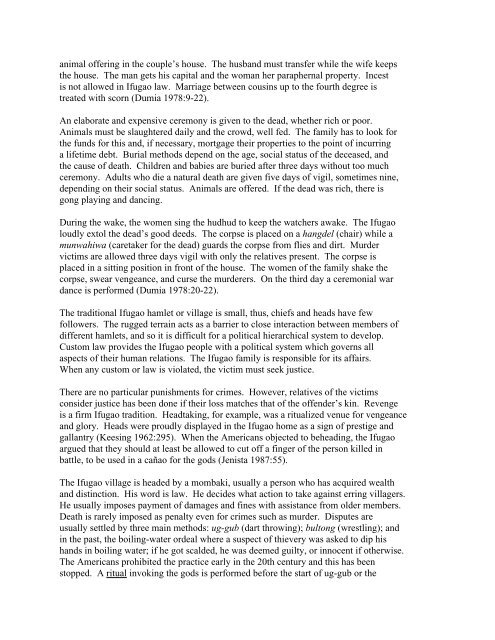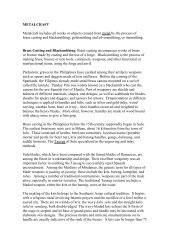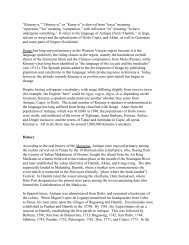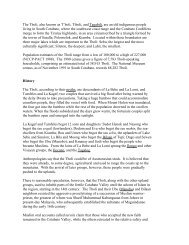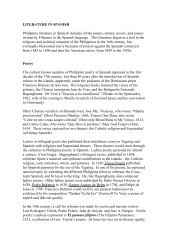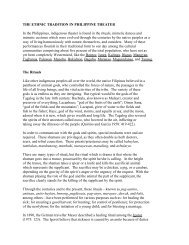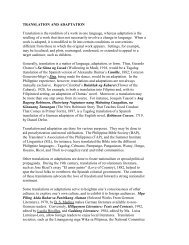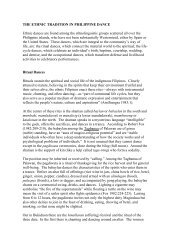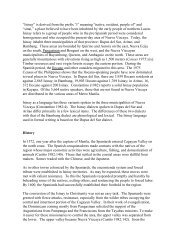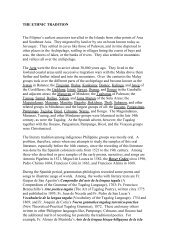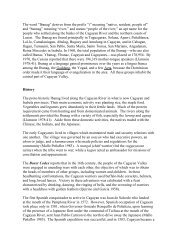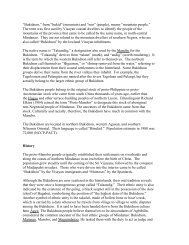“Ifugao” refers to the group of people living in Ifugao province ...
“Ifugao” refers to the group of people living in Ifugao province ...
“Ifugao” refers to the group of people living in Ifugao province ...
Create successful ePaper yourself
Turn your PDF publications into a flip-book with our unique Google optimized e-Paper software.
animal <strong>of</strong>fer<strong>in</strong>g <strong>in</strong> <strong>the</strong> couple’s house. The husband must transfer while <strong>the</strong> wife keeps<br />
<strong>the</strong> house. The man gets his capital and <strong>the</strong> woman her paraphernal property. Incest<br />
is not allowed <strong>in</strong> <strong>Ifugao</strong> law. Marriage between cous<strong>in</strong>s up <strong>to</strong> <strong>the</strong> fourth degree is<br />
treated with scorn (Dumia 1978:9-22).<br />
An elaborate and expensive ceremony is given <strong>to</strong> <strong>the</strong> dead, whe<strong>the</strong>r rich or poor.<br />
Animals must be slaughtered daily and <strong>the</strong> crowd, well fed. The family has <strong>to</strong> look for<br />
<strong>the</strong> funds for this and, if necessary, mortgage <strong>the</strong>ir properties <strong>to</strong> <strong>the</strong> po<strong>in</strong>t <strong>of</strong> <strong>in</strong>curr<strong>in</strong>g<br />
a lifetime debt. Burial methods depend on <strong>the</strong> age, social status <strong>of</strong> <strong>the</strong> deceased, and<br />
<strong>the</strong> cause <strong>of</strong> death. Children and babies are buried after three days without <strong>to</strong>o much<br />
ceremony. Adults who die a natural death are given five days <strong>of</strong> vigil, sometimes n<strong>in</strong>e,<br />
depend<strong>in</strong>g on <strong>the</strong>ir social status. Animals are <strong>of</strong>fered. If <strong>the</strong> dead was rich, <strong>the</strong>re is<br />
gong play<strong>in</strong>g and danc<strong>in</strong>g.<br />
Dur<strong>in</strong>g <strong>the</strong> wake, <strong>the</strong> women s<strong>in</strong>g <strong>the</strong> hudhud <strong>to</strong> keep <strong>the</strong> watchers awake. The <strong>Ifugao</strong><br />
loudly ex<strong>to</strong>l <strong>the</strong> dead’s good deeds. The corpse is placed on a hangdel (chair) while a<br />
munwahiwa (caretaker for <strong>the</strong> dead) guards <strong>the</strong> corpse from flies and dirt. Murder<br />
victims are allowed three days vigil with only <strong>the</strong> relatives present. The corpse is<br />
placed <strong>in</strong> a sitt<strong>in</strong>g position <strong>in</strong> front <strong>of</strong> <strong>the</strong> house. The women <strong>of</strong> <strong>the</strong> family shake <strong>the</strong><br />
corpse, swear vengeance, and curse <strong>the</strong> murderers. On <strong>the</strong> third day a ceremonial war<br />
dance is performed (Dumia 1978:20-22).<br />
The traditional <strong>Ifugao</strong> hamlet or village is small, thus, chiefs and heads have few<br />
followers. The rugged terra<strong>in</strong> acts as a barrier <strong>to</strong> close <strong>in</strong>teraction between members <strong>of</strong><br />
different hamlets, and so it is difficult for a political hierarchical system <strong>to</strong> develop.<br />
Cus<strong>to</strong>m law provides <strong>the</strong> <strong>Ifugao</strong> <strong>people</strong> with a political system which governs all<br />
aspects <strong>of</strong> <strong>the</strong>ir human relations. The <strong>Ifugao</strong> family is responsible for its affairs.<br />
When any cus<strong>to</strong>m or law is violated, <strong>the</strong> victim must seek justice.<br />
There are no particular punishments for crimes. However, relatives <strong>of</strong> <strong>the</strong> victims<br />
consider justice has been done if <strong>the</strong>ir loss matches that <strong>of</strong> <strong>the</strong> <strong>of</strong>fender’s k<strong>in</strong>. Revenge<br />
is a firm <strong>Ifugao</strong> tradition. Headtak<strong>in</strong>g, for example, was a ritualized venue for vengeance<br />
and glory. Heads were proudly displayed <strong>in</strong> <strong>the</strong> <strong>Ifugao</strong> home as a sign <strong>of</strong> prestige and<br />
gallantry (Kees<strong>in</strong>g 1962:295). When <strong>the</strong> Americans objected <strong>to</strong> behead<strong>in</strong>g, <strong>the</strong> <strong>Ifugao</strong><br />
argued that <strong>the</strong>y should at least be allowed <strong>to</strong> cut <strong>of</strong>f a f<strong>in</strong>ger <strong>of</strong> <strong>the</strong> person killed <strong>in</strong><br />
battle, <strong>to</strong> be used <strong>in</strong> a cañao for <strong>the</strong> gods (Jenista 1987:55).<br />
The <strong>Ifugao</strong> village is headed by a mombaki, usually a person who has acquired wealth<br />
and dist<strong>in</strong>ction. His word is law. He decides what action <strong>to</strong> take aga<strong>in</strong>st err<strong>in</strong>g villagers.<br />
He usually imposes payment <strong>of</strong> damages and f<strong>in</strong>es with assistance from older members.<br />
Death is rarely imposed as penalty even for crimes such as murder. Disputes are<br />
usually settled by three ma<strong>in</strong> methods: ug-gub (dart throw<strong>in</strong>g); bul<strong>to</strong>ng (wrestl<strong>in</strong>g); and<br />
<strong>in</strong> <strong>the</strong> past, <strong>the</strong> boil<strong>in</strong>g-water ordeal where a suspect <strong>of</strong> thievery was asked <strong>to</strong> dip his<br />
hands <strong>in</strong> boil<strong>in</strong>g water; if he got scalded, he was deemed guilty, or <strong>in</strong>nocent if o<strong>the</strong>rwise.<br />
The Americans prohibited <strong>the</strong> practice early <strong>in</strong> <strong>the</strong> 20th century and this has been<br />
s<strong>to</strong>pped. A ritual <strong>in</strong>vok<strong>in</strong>g <strong>the</strong> gods is performed before <strong>the</strong> start <strong>of</strong> ug-gub or <strong>the</strong>


